“My body is not an ornament, it’s an instrument.” - Christina Testut
Listen to our latest episode in the player here, on Apple Podcasts, Spotify, YouTube, or wherever you get your podcasts.
This Week on The Uplifters
Christina Testut knows that appearance is not the most important thing about a person, and she’s on a mission to bring this message to the next generation.
Christina Testut, nominated for the Uplifters by her husband and daughter, never felt like she was “enough,” and was always looking for external validation. About 6 years ago, she decided to go on a weight loss journey. She was noticed and celebrated for her weight loss; people called her “dedicated” and “inspiring”, and wanted to know how she did it. But despite all of the attention and kudos, she realized she still wasn’t happy.
During the great quarantine pause of 2020, Christina, a public school teacher, had a lot of time to reflect. She realized that obsessing over her appearance and watching every morsel of food she put into her mouth was just reinforcing that her body was the most important thing about her. She started to really pay attention to the ways society focused on the appearance of her 16-year-old daughter and her friends. She noticed that when people logged into Zoom meetings, the first thing they would do was apologize for their appearance. She saw teachers, neighbors, family, and friends all around her, virtually and in person, reinforcing that our looks were the most important thing about us.
Christina began to question how these messages were influencing her, so she started re-curating her social media, from following weight-loss accounts to accounts that were sending messages she needed to reinforce: “You are enough” and “You are more than a body.” Immersing herself in those messages helped to change the narrative in her head. She read a lot of books to help shift her mindset and also started therapy, which Christina credits with helping her learn to trust herself.
Now Christina doesn’t see her body as something that needs to be fixed; it’s not her identity. She wants to be seen for how she treats people, how she makes people feel about themselves, for the impact she makes in her students’ lives, and as a human being that deserves respect.
She forgot what kind of person she was when she lost weight because that’s when people were clapping for her the loudest. But she wasn’t mentally or emotionally healthy when she was smaller.
In this episode you’ll learn:
[00:08:00] How to evaluate whether a choice is authentically helpful for you or not.
[00:13:00] How tuning into yourself helps you guide your children in a positive direction
[00:15:00] How to change your environment to help change your mindset
Suggested reading:
Find more from Christina on Instagram and on tiktok @EmbraceYourFeatures
Let’s keep rising higher, together,
Aransas
Messy Transcript
Aransas: Christina. Welcome to the Uplifters Podcast. I am your host Aransas Savas, and today I am joined by Christina Testut. Christina has been a teacher for over 20 years in New York and has taken her mission and values and the challenges that she has seen amongst her students and her community and translated that into a children's book called Embrace Your Features.
Her goal with the book is to empower us all [00:02:00] to accept ourselves. And to embrace the features that make us all so beautifully and wonderfully unique. Christina, I have admired you and respected you for so long, and I'm so happy to welcome you to the Uplifters podcast. Thank you so much. When we first met.
You were really focused on weight loss and weight maintenance. You had lost a considerable amount of weight and we're really proud of that journey and we're we're helping others on a similar journey through sharing your story. So take me back to that time.
Christina: So that time was about six years ago and. I mean, I would have to go even further before that time to preface all of this with, I learned from a very young [00:03:00] age in in school that the way I looked, the way my body looked was just not enough.
Like I never really felt enough from a very young age, and I wanted. External validation and I was always seeking that external validation. And then after like growing up and having children, I married my high school sweetheart who always accepted me for me, all of a sudden when my kids were. Older, like, you know, school age.
I just decided like I needed to change myself somehow, and the way I was gonna change myself was to change my appearance. So I decided to go on a weight loss journey, and I became very good at losing weight very quickly, and I got noticed very quickly by many people by the program I was on, and [00:04:00] I was celebrated.
A lot for losing weight and people from work who never spoke to me before all of a sudden were interested in talking to me. And everybody just wanted to know how I did it. And I was called words like inspiring and dedicated, and I just was considered an amazing person all of a sudden, and I was starting to feel enough.
Because of external validation, and now I realize that I never really still felt enough for myself in the middle of all
Aransas: that. For somebody who thrived on external validation, that sort of attention must have been pretty exciting and motivating.
Christina: I was part of like a huge Instagram community and I made an Instagram account based on my weight loss and I participated [00:05:00] in Transformation Tuesdays and face-to-Face Fridays, and I made it like my job to post these photos and getting the comments that I did, which was a lot of comments and a lot of, you know, likes and sharing of.
Me and my journey. I, yeah, I felt good enough. I finally felt I was like that little kid in school who just wanted everybody to love them. And I finally felt the love, you know? And
Aransas: you've said that in spite of that you weren't feeling the love from you.
Christina: So like in the middle of it, you don't realize it.
You think every, like somebody wants to ask me recently when I shared my story, were you happy? And I had to like take a minute. To think because I'm sure everybody around me thought I was happy and I felt like. I was on top of the world, you know, with all the attention, but I still picked myself apart and I still [00:06:00] remember looking at pictures, even, you know, in a smaller version of myself and still thinking, I can't post this picture.
It's. You know, not good enough for, you know, I still had to pump myself up with affirmations, you know, in the middle of all of it. I got a tattoo that said I am enough, like that word enough, and that phrase, I am enough, seems to be a recurring theme for me, and I can go back all the, the way to when I was younger.
That was the feeling of never feeling enough. I didn't realize it at the time that I still was not happy for myself and happy with myself. Now
Aransas: I see it. When did your perspective on this journey start to shift?
Christina: I started feeling differently and I started feeling a mind shift like in 2020. I don't know if being in quarantine around that time had something to do with it.
Lots more time to think and wonder, reflect about what, you know, what was going on in the world. And I don't know that had a part in it. It might have, but I just started to [00:07:00] think more at that time about how. I didn't really wanna be obsessed anymore with my appearance and with measuring my food and counting every mor morsel of food that I put into my mouth.
And it kind of felt suffocated, kind of by it all. And I slowly thought I was making changes and I did. I started to make changes in how I saw food and looked at myself and. I tried to step away from the program I was on, and it took a long time, though I'm still learning and growing, but it took 2020, I wouldn't say until last year that I finally like realized I needed, um, some outside help and I got, you know, therapy and still in therapy for all that I've gone through.
Aransas: You talk about being focused on your appearance and the [00:08:00] perceptions of others as really being a driving force for those behaviors. And I think what I'm hearing in here is that the shift came from asking yourself, how am I feeling? And it was that moment where you started to say, I don't feel well that you started to understand what it was that you needed in order to heal.
And I wanna share while we're on this practice that I have used in my own life, because I too am somebody who. Likes to do the right thing and likes to be successful and can thrive in a place of big goals and lots of commitment. And the conversation I have with myself now is I know what my top values are.
You know what yours are, right? What are your top values?
Christina: Happy children. To have happy children, and for me to [00:09:00] be happy and at peace.
Aransas: Yeah, those are three big ones. So yeah. Your relationship with your husband, your relationship with yourself, and your children's happiness. Mine are pretty similar. It's my healthy mind and body. It's my relationship with my husband. It is the health and wellbeing of my children and my work. I like my friends, I love my, the rest of my family.
But if I had to name four top things that I am that are driving my choices every single day, it's those, it's those four. And so when I'm trying to make a decision about whether to stick with something or start something, even my new filter for myself that I have found so powerful is to say, will. This, make my mind and body healthier.
Will this help my relationship with my husband be stronger? Will this help my children be healthier [00:10:00] and happier? Will this support my purpose work? And if the answer isn't yes, really to all of those, or at least most of those, And oftentimes things I want to do actually are, I know on all of those, but that's how I talk myself back into a place of integrity is by gut checking against my values.
I share that because I really heard you doing that or organically. And so when you look back on what you were doing, how does it sit with your top values? How is it affecting your relationship with yourself, your relationship with your husband and your children? Well,
Christina: at the time it wasn't helping, but I thought that it was because diet culture has a way of making you feel like if you lose weight, it's the answer to everything and it will trickle into your life.
I'm grateful to have a husband who, [00:11:00] like, he's supposed to love me unconditionally no matter what I look like, and he fell in love with me in high school. And I was always in a larger body, so he fell in love with me in a larger body. I had asked him recently, why didn't you say anything to me when I was so deep into what I was doing?
And he said, I'm a supporter. You know, I support you. Sorry to your, I support you no matter what. And so I thought you were happy, so I was supporting you. And now of course he's supporting me in this part of my journey wholeheartedly, and learning from me as well, you know? And then my children. I'm so glad I'm at the place I am now because I feel like if I wasn't my, you know, my daughter's gonna be 16, all you hear about in high school, Is appearance and how you look.
And she started hearing it early on [00:12:00] in middle school at the bus stop from young sixth and seventh grade girls, you know? And I don't think I would've been able to have given her the answers and the support, but I give her now if I was still stuck in diet culture, because I probably would've given her an answer like, Join me in in this diet, you know, and my son as well, you know, like he comes home with health homework and he'll say to me, isn't this fat phobic?
Mommy isn't this, isn't this like anti-fat? And he's a seventh grader. And I think to myself, I would've never been able to have instilled that in them if I was still stuck where I was. So I hope that answered the question. Now I realize that what I'm doing is keeping my children happy and healthy, and my relationship with my husband and myself of course [00:13:00] is, you know, much better now.
I wasn't able to answer those questions back then.
Aransas: Yeah. And sometimes we need a bit of distance in order to answer them. I'm so glad. Yeah. You brought that up. And it sounds like the pandemic was what gave you that space to tune back into you. Yeah. So what's different now?
Christina: I trust myself more than I trust a diet program.
I trust myself more than I trust what the world is telling me I should be, or I should look like I'm choosing myself over. What I think other people want me to do or want to see me
Aransas: as. That sounds hard. If you've spent your whole life training to care about what other people think and to distrust your own needs, what has [00:14:00] helped you make that change?
Christina: Therapy number one, and I wish I would've sought out help sooner, you know? I spent a whole year trying to do it on my own. And although in that year that I did it on my own, I was reading and doing my own, you know, reflection and curating my social media feed. You know, my, like I mentioned in the beginning, my Instagram was all weight loss accounts, and that's what followed me and that's what I followed, and that wasn't helping me in my healing or recovery at all.
And so trying to find accounts that. Were sending me the messages I needed to hear. And reading those messages helped me change the narrative in my head. And I discussed this with my therapist posting my story, my recovery, my truth, even though I was scared and didn't want haters and, you know, [00:15:00] trolls, I hosted it anyway.
And we discussed that. That was helping me change the narrative as well. From being a weight loss success story and posting transformation photos constantly, I needed now to see and hear the difference that was going on in
Aransas: my life. Yeah. What strikes me about that and two levels is, number one, we know that environment is one of the biggest factors in our mindsets, and so if you were getting.
Bombarded with messages at school, messages from your neighbors, and thousands of messages from the internet that your only worth, or the only reason to pay attention to you was because of your weight loss. That's what you're gonna believe. Yeah. And so I think for all of us, there's a really powerful message in your story [00:16:00] there that if the messages we're getting and that we are surrounding ourselves with are not aligned with the growth work we need to do, then we need to change our environment.
Mm-hmm. And so you actively re curated. Your environment to get a new surround sound message. Yes. Which was transformation comes in many flavors, from unhealthy to healthy, from unhappy to happy. Right. Weight ist the only transformation, but that we can create change and progress and transformation truly in our lives and many different ways.
It's just you defined that transformation on your terms. Right. Based on this, you probably have a unique seat to books, Instagram accounts and resources that Uplifters could look at if they're interested in sort of expanding their own perspective, would you be willing to share those with us? Yes, of course.
Awesome. So on the heels [00:17:00] of this, just for those of you listening, if you'll go to the uplifters podcast.com, you will find both a transcript of this conversation as well as a list of resources from Christina that will make sure to provide you there. Awesome. So Christina, how do you see your body now?
Christina: I.
Tell you how I don't see it. That's an easier way for me to answer it. I don't see it as something that needs to be fixed. I don't see it as my identity. Like my body is not what I'm about. Like it's not, you're not gonna be able to tell anything about me by just looking at my body. So I used to make it part of my identity.
It was my whole identity, actually, but now it's not. So I don't see it as, What makes me who I am or the only part of who I am, I should say. There's a saying that I learned through all the reading that I've done. [00:18:00] It's, my body is not an ornament, it's an instrument. So I'm seeing it for what it can do and not what it looks like.
Aransas: How do you want to be seen in the world?
Christina: I wanna be seen, sorry for. How I treat people, how I make people feel about themselves for the impact I make in my students' lives. I just wanna be seen for all my personality traits that make me a good human, you know? And for people who don't know those personality traits that just, you know, see me walking down the street or running, I would like them just to see me as a human being that deserves.
You know, respect, because unfortunately in this world there's a lot of judgment people just by looking at them,
Aransas: and none of those personality [00:19:00] traits that you describe are about your body and. As I think back to how you described the feedback you were getting during weight loss mode, she's a hard worker.
She's dedicated you in some ways, still want that feedback. I think you wanna be perceived as hardworking and dedicated. It's just that now, It's not about your body, but about how you show up for your students, how you show up for your husband, your children, yourself.
Christina: But the thing is, I forgot that I was always that type of person and then when I, I, I was always dedicated.
I was always a hard worker. I was always passionate about my teaching and my students, and I forgot all of that when I lost weight. Mainly because people clapped for me the loudest when [00:20:00] I lost weight.
Aransas: That makes it sound like you're doing it best at that point, but how true is
Christina: that? It's so hard to rewire your brain and retrain your brain to believe that you don't need to be smaller.
In order for people to compliment and celebrate you, especially when the messages of the outside of the world is that smaller is best, smaller equals healthy, but I wasn't mentally healthy or emotionally healthy when I was smaller. But as a society, we don't really put the emphasis on that. We just see smaller and we think they're amazing.
They're smaller, you know? That makes them amazing.
Aransas: It's really strange when you step back. Yeah. And
Christina: examine it. It really is. And again, I know that might be people listening that are thinking, but that's not true. That's not my story. And [00:21:00] when you are in the middle of all of it, when you're in the obsession of it and you're getting all the love and the praise and the compliments, you are not in the mindset to see.
How it really does sound and it really does
Aransas: come off and to me, I think there are many people for whom losing weight, getting stronger, getting healthier, are very much linked up for them, and that part of the package of getting physically and mentally healthier is. Making a smaller body and showing up for themselves and prioritizing themselves, but that's not always the case and it shouldn't be assumed that that is the answer.
We need to rewind the conversation. Yeah. And start with, well, what would make me physically mentally healthier? What would be better for my relationships? What would be [00:22:00] better for my purpose and impact on this planet?
Christina: Not what would help me lose weight, what would help me look
Aransas: better uhhuh, what would help me get more praise and more acceptance?
Christina: Right. Just like making changes to make healthier, you know, choices for, like you say, your mind, body, and soul, you know, but not put weight loss on the pedestal, on, you know, at the forefront. Cause then what are we telling everybody else in a larger body? Because they're not smaller, they're not worthy because they're not on a weight loss journey, that they're not good enough.
And that's the messages you get whenever you. Go on social media. I can't look at a picture of Lizzo without seeing the horrible comments people write about her. And I think to myself, she's a human being. She's a daughter. She, you know, has family and friends who love her, and these people are calling are such [00:23:00] horrible names.
As she gets up on a stage and works her butt off to sing and dance at the same time, which is very hard and a physical feat in and of itself. But they don't even know her. And they don't know the real her. And I just give her as that one example. I know she's a celebrity, but there's constantly every day people who get harassed for how they look when nobody really knows their true story.
And even if they don't wanna lose weight, that's
Aransas: none of our business. Well, and I think with Lizzo, she is wildly astonishingly talented. And part of what has contributed to her extraordinary popularity. We hosted her at an event in Minneapolis when she was a very much unknown performer, no, not even a decade ago.
And now here she is one of the top performing artists in the world. And I think what has [00:24:00] contributed to that rise is that she was unapologetic. About herself, and she didn't make her choices about what to do or be based on others' perceptions, but she was wildly authentic and in integrity with herself and in her own way.
I don't know what scripts she uses or how she talks to herself, but in her own way I imagine that she was doing what we're talking about here. Which was, instead of saying, what does the music industry want me to be? What does the audience want me to be? What do even, you know, people in my neighborhood want me to be?
What do trolls on the internet want me to be? And she was saying, who am I? And just embracing that. So what inspired you to write this book? Speaking of embracing.
Christina: This book came out of my recovery and healing from Diet Culture and Stepping Away, and it also came out of 2020, so it [00:25:00] actually was inspired by Instagram posts that I tried to write in 2020 because with the Zooms and Google meets and the remote learning and all these virtual meetings, I noticed.
More than ever than when people came onto a screen, they apologize for how they looked. They would say, I'm sorry, I have no makeup on. Or I'm sorry my grays are showing. Or they wouldn't put the camera on and say, you don't wanna look at me, you'll be scared. And I felt started to feel uncomfortable cuz then you think about yourself, wait, do I look good enough to be on camera?
Like, is am I okay? And then I just also felt sad that they were feeling that they needed to apologize. But how about their appearance? I heard teachers say it, I heard my own children's teachers say it, and my children would say to me, oh, why is she saying that again? And I would think like, if, if my children are uncomfortable or feeling bad and I'm feeling badly, like what is everybody else thinking?
What are [00:26:00] other children thinking when they hear their parents or their teachers? Apologizing for their appearance. I know we like tend to call parts of us flaws in the world. And being a teacher and just words always being powerful to me, I decided just to look in the dictionary like what does flaw mean versus something like a feature.
And when you look up flaw, you see words like defects, you know, imperfection, something that Mars you. And then when you look up the word feature, it's just like at, at, you know, a trait. And I thought to myself, wow, we're calling parts of us flaws, defects, something that Mars you, our eyes, our nose, you know, our skin, our hair, whatever, our bodies, whatever it may be.
Like, wow, like that's horrible. Like I don't wanna call parts of myself a defect. And so I wrote this post. [00:27:00] About, you know, dissecting the words, flaws and features and you know, I would post the hashtag, embrace Your Features instead of flaws like for a long time. And I just wasn't making the impact that I wanted it to make in the world.
And when I started to go to therapy last year, I just was reflecting more and more than ever, and I thought, Wouldn't it be great if I can make an impact with children our next generation? At the same time, maybe they're grownups. And so I started looking into how to write, you know, get a book out there, and I did.
And that's how Embrace Your Features was Born.
Aransas: Aw. For those of you who are watching this on YouTube or the uplifters podcast.com, you'll be able to see a cover of the book. We'll definitely link to it in our show notes. What has the response been to this story?
Christina: Amazing. I mean, the [00:28:00] parents of my students just have sent me the most beautiful messages, teachers from other schools.
I was able to like read the book to another school or, um, in Manhattan and didn't know any of the people, the children, the teachers, and just reading it to them and their reaction and the questions my whole school community like just. Anybody who has read it have just reached out and said things like, I wish I had a book like this when I was younger, and that's what I wanted.
Like it helped me heal. I had said I want it to help the inner child of all of us and in at the same time, hopefully help our children grow up believing that their features make them special and unique and are not the most important thing about them.
Aransas: What do you believe would be possible if we all embraced our features?
Christina: Well, actually one of my favorite parts of the book, [00:29:00] I think that when we embrace our features, we give others the permission to embrace their features, and so, Embracing your features. Not just benefiting you, but it's showing your family members, your friends, your community, that it's okay that they embrace their features as well.
And then maybe we wouldn't be so caught up in things like, you know, how full our lips are, or how great our eyebrows looked, or how thin our bodies were, but maybe we could, you know, start changing the world. In more important ways and deal with things that really impact, you know, the country
Aransas: and the world.
So I think what you're saying there is that we put a lot of our precious energy and time and resources into manicuring and fine tuning our physical appearance. And I think what we take from your story is if we were to simply embrace our features, [00:30:00] And embrace others. We would free up an extraordinary amount of resources, energy, and time to be the humans we wish to be in the world.
And again, I don't think there's anything wrong with taking care of our bodies. I'm a huge proponent of self-care. I think it's absolutely essential to take care of our minds and bodies. And you're still doing lots of that. You're still doing lots of self-care and self-improvement, and at the same time, you're doing it on your terms based on what serves your values and your priorities instead of just what you've been told is popular or expected or celebrated.
Yes. So what are your
Christina: best features? My best features are how empathetic I am. How nurturing and caring and loving that I [00:31:00] am. I also think that I have really good hair and I like my hair. For a long time I didn't and tried to straighten it a whole lot and not embrace its waviness, so I'm embracing its weightiness.
Aransas: Beautiful, thanks. And what do you hope your kids see in their features?
Christina: I hope that they see that. Their features don't define them and their scars, their skin. My daughter has a, a skin condition. My son has a s birthmark on his forehead. I want them to embrace those things and not want to change them or hide them.
Aransas: What a freeing experience. Yeah. Yeah, so Christina, we like to end every episode of our podcast now with a little gift to ourselves as uplifters. And like you, our [00:32:00] audience members uplifters in invest a lot in making their communities and the world better through their actions. And that takes a lot of energy.
And it takes a lot of time and so I try to out a few minutes at the end of each episode for us to reinvest. And ourselves a little bit. And so I wanna just invite us all now to place one hand on our hearts and one hand on our guts. Close your eyes if you're not driving. And allow yourself to really notice your breath, and sense that connection between your hand and your heart.
Feeling your heart beat,
feeling your belly. [00:33:00] Rise into your stomach with each breath,
and maybe just for this one moment, we fully allow our shoulders to soften and relax, and we allow our gut to just hang out
and give ourselves a full moment of freedom. From expectation, a full moment of freedom from holding or hiding, whatever we may be holding or hiding.
Notice what it feels like to let it all hang out. Take another deep cleansing breath, and when you're [00:34:00] ready, open your eyes and if something came to you in that moment that you want to look back on again and get a little more curious about, maybe just make a quick note for yourself. We can get so busy in the hustle and the bustle and the doing and the making progress that we lose track.
Of these things when they come to us. And so by noting them, we just give ourselves a little extra reminder to come back to what matters most truly to and for us. Christina, thank you for being here. Thank you for sharing your story. Thank you for being so. True. Thank you. We are all better for hearing your perspective and your experience.
Christina: Thank you.
Aransas: Uplifters, I'll see you [00:35:00] over@theuplifterspodcast.com, where you'll find lots more uplifters and lots more inspiration every week. Delivered directly to your inbox. Subscribe for free if you haven't done so already. Let's keep rising higher together. Thank you for listening to the Uplifters podcast.
If you're getting a boost from these episodes, please share them with the Uplifters in your life and then join us in conversation over@theuplifterspodcast.com. Head over to Spotify, apple Podcast, or. Wherever you get your podcast and like, follow and rate our show, it'll really help us connect with more uplifters and it'll ensure you never miss one of these beautiful stories.
Big love









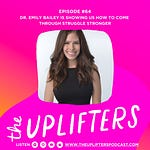
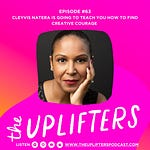

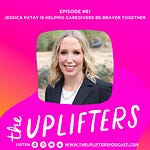
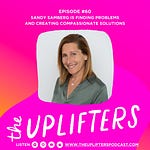

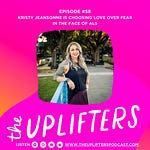
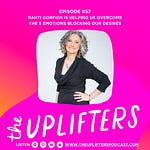
Share this post